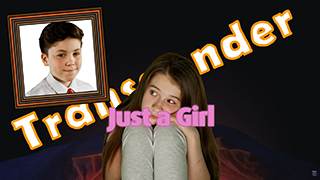BBC widely criticised for promoting transgender ideology to young children

The BBC has come under widespread criticism, after airing a programme depicting an eleven-year-old boy, who identifies as a girl.
Initially aired on the CBBC website in September, 'Just A Girl' is an audio programme set to animation, which depicts the fictional story of a boy who refers to himself as 'Amy', and is taking sex-change hormones.
The programme’s synopsis says: "Amy has a secret and she's scared that it will come out at her new school. Follow her as she tries to make sense of the world and not lose her friends forever."
Two MPs have expressed concern that this programme is being offered to children as young as six, describing it as "inappropriate".
'Very disappointing and inappropriate'
Peter Bone, Conservative MP for Wellingborough, told the Mail on Sunday that he was concerned that this material should be made available to such young children.
"It beggars belief that the BBC is making this programme freely available to children as young as six,” he said. “I entirely share the anger of parents who just want to let children be children."
Julian Brazier, Conservative MP for Canterbury, expressed concern the programme’s content may have harmful effects on children’s minds: "This programme is very disappointing and inappropriate. Children are very impressionable and this is going to confuse and worry them."
'CBBC aims to reflect true life'
In a statement defending the programme, the BBC said: "Just a Girl is about a fictional transgender character trying to make sense of the world, deal with bullying and work out how to keep her friends, which are universal themes that any children relate to, and which has had a positive response from our audience."
It claimed: "CBBC aims to reflect true life to our audience, providing content that mirrors the lives of many UK children as possible – you only have to look at programmes such as The Dumping Ground or our BAFTA-winning and ground-breaking transgender story I am Leo to see that is the case."
'Children will become utterly confused'
Norman Wells, of the campaign group Family Education Trust, also emphasised the unsuitability of the programme for young children. He said: "It is irresponsible of the BBC to introduce impressionable children as young as six to the idea that they can choose to be something other than their biological sex."
He added that promoting stories like this will, rather than helping children to understand the world they live in, instead confuse them further.
"The more we promote the idea that a boy can be born into a girl’s body and a girl can be born into a boy’s body, and that drugs and surgery can put things right, the more children will become utterly confused," he said. "Respecting and preserving a child’s birth sex should be seen as a child protection issue."
But according to a 2009 study, the percentage of people in the UK who had undergone gender reassignment surgery only amounted to 0.1% of the population.
Promotion of ideology
The complaints about the CBBC show follow criticism from a Times columnist, after the BBC aired a radio interview with a young girl who identifies as 'gender non-binary', and her mother.
After the interview, which aired on BBC Radio 4 in September, columnist Janice Turner said this is the "first time" she has ever complained to the BBC, for the way it portrayed the story, and failed to challenge the girl’s mother.
Janice Turner said that with interviewer Jennifer Tracey’s refusing to challenge Leo’s mother, the BBC "is allowing to enter the mainstream, unquestioned, a pernicious ideology that demands parents patrol their children for gender crimes — boys who like dolls, girls who climb trees — and then seek a label and treatment."
